
The International Labour Organization (ILO) is a United Nations agency whose mandate is to advance social and economic justice through setting international labour standards. Founded in October 1919 under the League of Nations, it is the first and oldest specialised agency of the UN. The ILO has 187 member states: 186 out of 193 UN member states plus the Cook Islands. It is headquartered in Geneva, Switzerland, with around 40 field offices around the world, and employs some 2,700 staff from over 150 nations, of whom 900 work in technical cooperation programmes and projects.
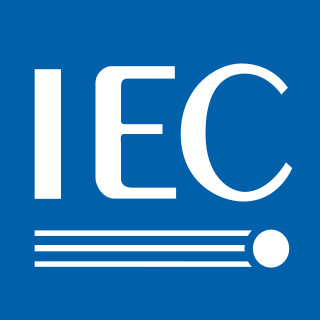
The International Electrotechnical Commission is an international standards organization that prepares and publishes international standards for all electrical, electronic and related technologies – collectively known as "electrotechnology". IEC standards cover a vast range of technologies from power generation, transmission and distribution to home appliances and office equipment, semiconductors, fibre optics, batteries, solar energy, nanotechnology and marine energy as well as many others. The IEC also manages four global conformity assessment systems that certify whether equipment, system or components conform to its international standards.
The United States Armed Forces are the military forces of the United States of America. It consists of six forces: the Army, Marine Corps, Navy, Air Force, Space Force, and Coast Guard. The president of the United States is the commander-in-chief of the Armed Forces and forms military policy with the Department of Defense (DoD) and Department of Homeland Security (DHS), both federal executive departments, acting as the principal organs by which military policy is carried out. All six armed services are among the eight uniformed services of the United States.

The International Joint Commission is a bi-national organization established by the governments of the United States and Canada under the Boundary Waters Treaty of 1909. Its responsibilities were expanded with the signing of the Great Lakes Water Quality Agreement of 1972. The commission deals with issues affecting the extensive waters and waterways along the Canada–United States border.
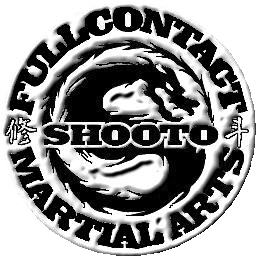
Shooto is a combat sport and mixed martial arts organization that is governed by the Shooto Association and the International Shooto Commission. Shooto was originally formed in 1985, as an organization and as a particular fighting system derived from shoot wrestling. Practitioners are referred to as shooters, similarly to practitioners of shoot wrestling. Shooto rules have evolved such that their events are now true mixed martial arts competitions.

The United Nations Commission on Narcotic Drugs (CND) is one of the functional commissions of the United Nations Economic and Social Council (ECOSOC) and is the central drug policy-making body within the United Nations system and has important functions under the international drug control conventions.
The Joint Commission, also known as TJC, is a United States-based nonprofit tax-exempt 501(c) organization that accredits more than 22,000 US health care organizations and programs. The international branch accredits medical services from around the world. A majority of US state governments recognize Joint Commission accreditation as a condition of licensure for the receipt of Medicaid and Medicare reimbursements.
The Commission for Environmental Cooperation was established by Canada, Mexico, and the United States to implement the North American Agreement on Environmental Cooperation (NAAEC), the environmental side accord to the North American Free Trade Agreement. The CEC's mission is to facilitate cooperation and public participation to foster conservation, protection and enhancement of the North American environment for the benefit of present and future generations, in the context of increasing economic, trade and social links among Canada, Mexico and the United States.
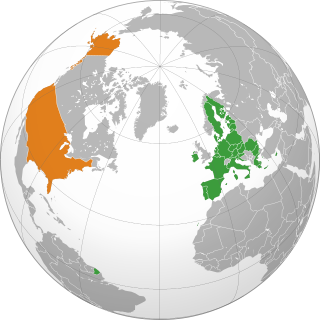
Relations between the United States and the European Union are the bilateral relations between the country and supranational organization. The US and EU have been interacting for more than sixty years. US–EU relations officially started in 1953 when US ambassadors visited the European Coal and Steel Community. The two parties share a good relationship which is strengthened by cooperation on trade, military defense and shared values.
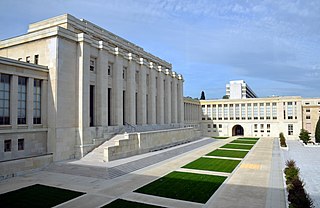
The United Nations Office at Geneva (UNOG) in Geneva, Switzerland, is one of the four major offices of the United Nations where numerous different UN agencies have a joint presence. The main UNOG administrative offices are located inside the Palais des Nations complex, which was originally constructed for the League of Nations between 1929 and 1938.
The Standing Committee on Foreign Affairs and International Development (FAAE) is a committee in the House of Commons of Canada that focuses on Canada's foreign policy and international development.
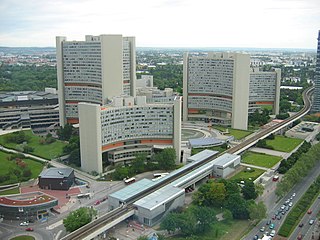
The United Nations Office at Vienna (UNOV) is one of the four major office sites of the United Nations where numerous different UN agencies have a joint presence. The office complex is located in Vienna, the capital of Austria, and is part of the Vienna International Centre, a cluster of several major international organizations. UNOV was established on 1 January 1980, and was the third such complex to be created.
A job description or JD is a written narrative that describes the general tasks, or other related duties, and responsibilities of a position. It may specify the functionary to whom the position reports, specifications such as the qualifications or skills needed by the person in the job, information about the equipment, tools and work aids used, working conditions, physical demands, and a salary range. Job descriptions are usually narrative, but some may comprise a simple list of competencies; for instance, strategic human resource planning methodologies may be used to develop a competency architecture for an organization, from which job descriptions are built as a shortlist of competencies.
This page is based on this
Wikipedia article Text is available under the
CC BY-SA 4.0 license; additional terms may apply.
Images, videos and audio are available under their respective licenses.






